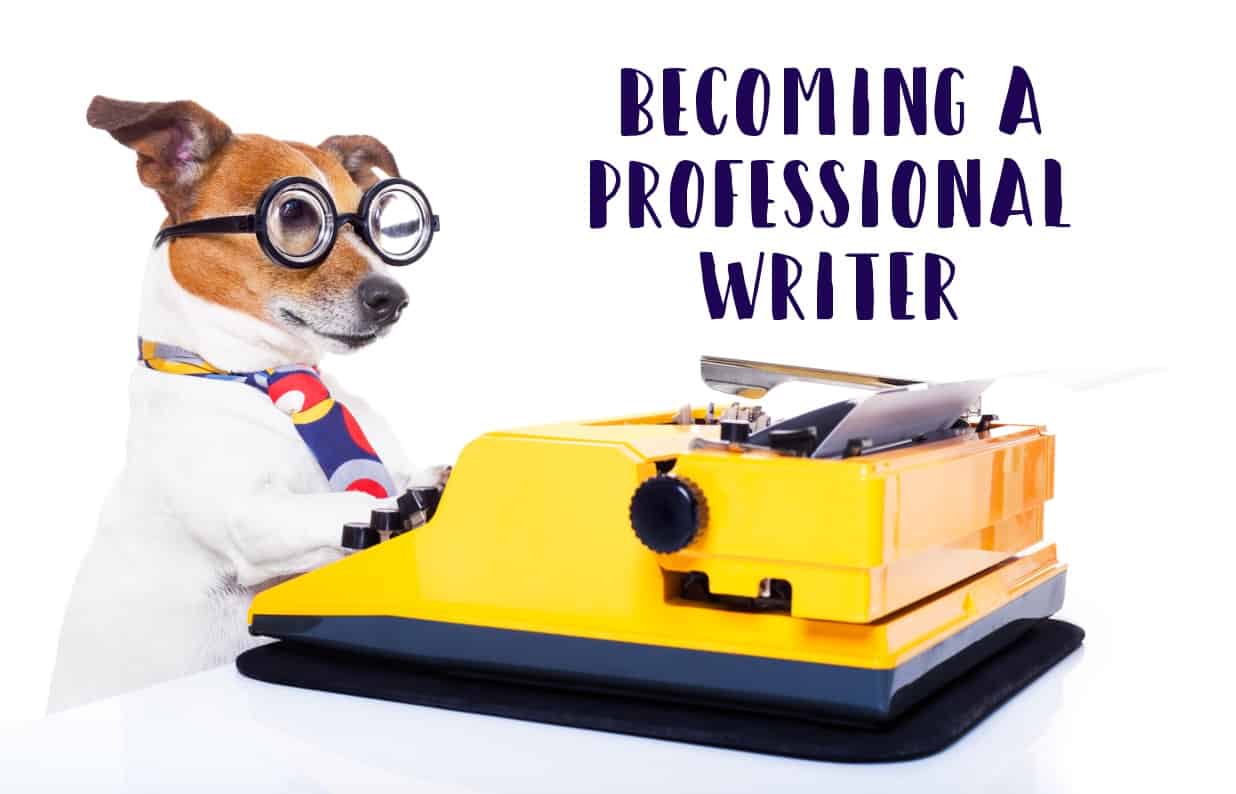The importance of skillful writing has most certainly become more apparent nowadays. Well-written blog posts, speeches, advertisements, product copy, TV shows or instruction manuals can be invaluable to businesses. No matter what kind of writing you want to do, there’s a write—excuse me—right way to go about becoming a professional writer.
How To Become a Professional Writer
To start, writing is not for everyone. Just like anything else in the professional world, writing is a skill that has to be worked on and developed over time to really grow into something that can be marketed and turned into a full-time money-making career. Learning how to become a writer doesn’t happen overnight.
There are also many different types of writing out there that need to be approached in different ways. Technical writing, creative writing, scriptwriting, business writing, medical writing, legal writing and copywriting all have slightly different goals and utilize different skill sets/experience. On the one hand, it’s exciting to know all the different writing opportunities that are available to you as a freelance writer, but on the other hand, it’s important to make sure you’re developing the right writing skills in order to become the writer you hope to be some day.
While deciding what kind of writer you want to be doesn’t have to be done right away, there are some things you can start doing now to help get you on your way to becoming a writer. People commonly take these five steps to earn the title of professional writer:
1. Write, Write, Write
The first step you need to take to become a writer is … to write. Obvious, yes, but it’s more important than you may realize. Before you invest in classes, a degree or anything else, it’s best that you make sure you actually like writing. If you don’t, you’re wasting time and money you could invest in pursuits you actually enjoy. Take out time to write, blog or journal, and ask yourself if you could do this day in and day out for a living. Here are some other writing exercises you can do to gauge your actual level of interest in becoming a writing professional:
- Start a personal blog
- Do some creative writing (short stories)
- Journal (either online or in private)
- Join a writing workshop
- Write letters/emails to friends or family
Whether in public or private, start putting some words on paper. The joy of writing comes in the doing. You’ll quickly realize that good writing takes into account more than just words when you factor in spelling/grammar, flow, outlines, reader intent, tone and style. It’s a form of art to be able to get it all to flow together in a way that someone finds value in it—whether that be in the form of entertainment, information, emotion or otherwise.
The first step in learning how to become a writer is ultimately to find the desire within to write.

2. Earn a Degree
To get the most out of your professional writing career, you’ll likely need a degree. What degree should you get to become a writer? While there is no “one” degree that is a must-have, there are many degrees that will give you a well-rounded approach to writing in a professional atmosphere.
For instance, an undergraduate degree in communications, English, journalism, technical writing, fine arts, creative writing or professional writing is sure to open more doors and offer you more opportunities than not having a degree related to writing. Also, your school might offer job placement to help you get started or writing resources you can put to good use. You might look for internships or online content writing companies that will allow an unseasoned writer to start gaining experience while working through a degree.
In many cases, developing your writing through internships and freelance writing can open doors to be a professional writer even without a degree. Being a writer without a degree has its benefits in that you can start working right away, but your earning potential may also be limited depending on the niche of writing you are pursuing.
When learning how to become a writer, considering the educational avenues you want to go down to help build your portfolio and harness your skills is a worthy venture.
3. Build Your Writing Portfolio
Any school writing projects you complete or work you have published should be added to your professional writing portfolio. Your portfolio shows potential employers the kind of work and results you produce, and it could be just the thing they need to make a decision regarding hiring you. If possible, add a variety of content types to your portfolio to show that you’re a well-rounded, experienced writer.
Some other ideas of how you can add “published” content to your writing portfolio include:
- A personal, online blog
- Guest posts on online publications
- Product copy on an Etsy site
- A press release on a free PR platform
The internet is your best friend when it comes to developing your writing portfolio to help you become a professional writer. Expand your network and try to get blogs/articles on other people’s sites. Usually, if you pitch them on providing the content for free in exchange for a byline with your name and a link back to your website, you can get author credit to help boost that writing portfolio. This is one of the best avenues to pursue when wondering how to start a writing career.

4. Decide What Kind of Professional Writer You Want To Be
One of the absolute best things about being a professional writer is that there are so many avenues to explore. It’s a good idea to seek out as many of those avenues as possible to see what’s out there. Doing so will help you decide if there’s a specific area of writing in which you’d like to specialize.
For instance, do you have a knack for composing marketing or advertising material? Do you feel that you’re better suited to technical writing? Or maybe you like writing essays, product descriptions and articles for magazines and online sites. Decide on your focus area, and always remember that there are likely a few writing stones you have yet to upturn. In other words, always be on the lookout for new writing opportunities. Here are a few more professional writing opportunities you might explore:
- Medical writer
- Legal writer
- Technical writer
- Proposal writer
- Copywriter
- Business blog writer
- Video script writer
- Grant writer
- Content writer
- Freelance writer
- Resume writer
- Novelist
- TV writer
This isn’t a comprehensive list of the types of writing professions out there, but I think you’ll start to get the point. There’s always a need for good writing! Try your hand at a few different types of writing to start narrowing down your strengths and preferences of writing. Once you do, you’ll be much closer to your ultimate goal of becoming a writer.
5. Look for Writing Work
There are plenty of online resources available for finding writing work, and knowing the type of writer you want to be can help you know which resources to use and how to use them. If there’s a magazine you’d like to contribute to, check their website to see if they accept work from freelance writers. Explore job boards to see if you’re interested in any companies that might be in need of a writer of your caliber and with your expertise.
If you really want to learn how to become a writer, you have to be persistent in looking for writing work. At the beginning of your writing career, your options may be slim. But as you add to your portfolio and gain experience through different writing projects, more doors will open to you, and the idea of becoming a writer full-time will look much more doable than it did in the beginning.
You Can Learn How To Become a Writer!
While there’s a lot of hard work involved with becoming a professional writer, it’s most certainly worth it in the end. The key is to not skip the developmental writing steps. Your writing will become better the more you practice, and your writing portfolio will get more robust over time if you keep at it. If you have any additional tips or steps to becoming a writer that you’d like to share, leave them in the comments below!


Leave a Reply